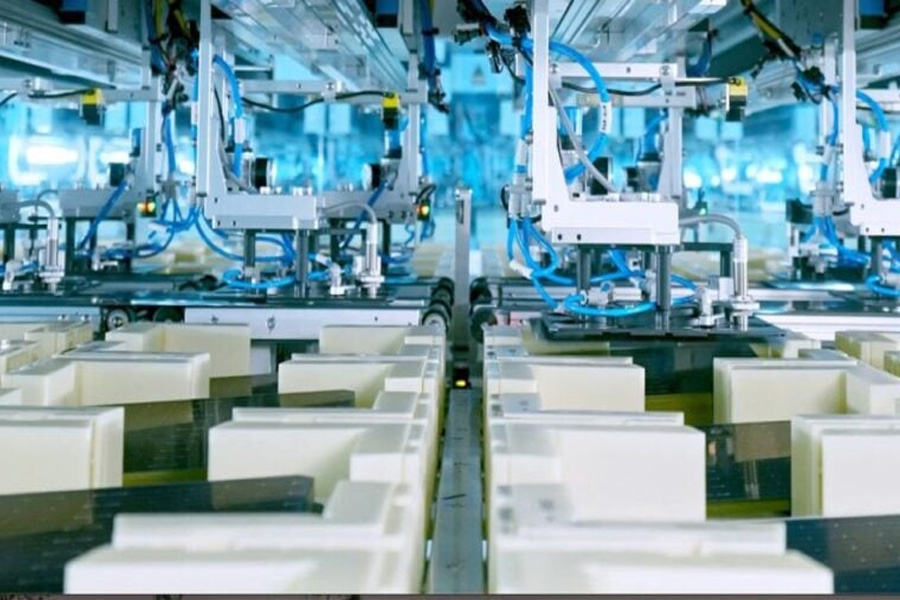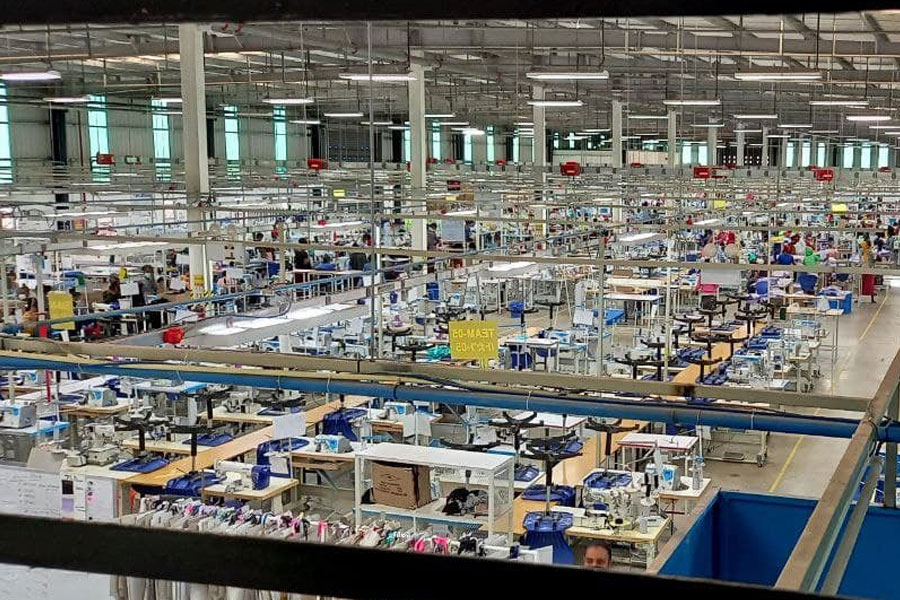
Radar | Oct 19,2024
Uncertainty continues to loom over hundreds of employees in Hawassa Industrial Park as three international firms leasing sheds move forward with plans to slim their workforce.
Last week, Sumbiri Hela Intimates Plc, a joint venture between Hela Indochine Apparel and Sumbiri Intimate Apparel, put 260 workers on paid leave for one month, with the possibility of an extension to three months. Both sides of the joint venture set foot in the Park four years ago and operated independently before the Sri Lanka-based Hela Apparel acquired a 50pc stake in Sumbiri Intimates in January 2021.
Sumbiri Hela Intimates Plc operates inside an 11,000sqm shed with average export earnings of 350,000 dollars annually.
“Orders from our buyers dropped by half in recent months,” Biniam Tariku, commercial and logistics manager, told Fortune.
Arega Getachew joined Sumbiri Hela Intimates a year ago as an industrial engineer executive. He was one of the employees placed on leave.
“I’m hoping I will get back to work soon,” he said.
The management has plans to offer the same deal to an additional 160 employees, putting a third of its 1,500 workers in anxiety.
“It’s only until the orders return to normal,” said Biniam.
Last week, Quadrant Apparel Group, which moved into Hawassa five years ago, gave half its 300 workers two months’ notice with pay to search for employment elsewhere. With a production floor of 5,500sqm, Quadrant Apparel has a daily production capacity of 11,300 pieces of women’s underwear, blouses and shirts. Ethiopian and Spanish investors own the company.
Its management was unavailable for comment.
Angesom Gebreyohannes heads the Industrial Federation of Textile Leather & Garment Workers Trade Union, which represents 54,000 members organised under 113 unions, including those formed by workers in Hawassa Industrial Park. He is aware of the situation developing in the Park. His team discusses workers’ compensation with the labour unions and the management.
What drives business slowdown is the departure of Philips-Van Heusen Corp (PVH), an international apparel company that pioneered Hawassa Industrial Park. Last November, PVH announced the termination of operations in Ethiopia. It had strong commercial relationships with 15 of the 20 companies leasing space in the Park.
Six years ago, the federal government established Hawassa Industrial Park, the largest among 13 in operation, hoping to make the country a leading apparel and textile hub and generate one billion dollars in revenue annually. But the Park has not lived up to the expectations. Companies there generated 114 million dollars in export revenues last year, with markets in the US and Europe accounting for the bulk.
A little over a month after the departure of PVH, President Joe Biden debarred Ethiopia from the African Growth & Opportunity Act (AGOA). The preferential trade regime allows eligible countries to export goods duty and quota-free to the American market. The debarment pushed Hawassa Park’s tenants to the edge as many depend heavily on US buyers. Ethiopia generated 240 million dollars two years ago, exporting under AGOA, representing 40pc of the total shipments the country sent to the US.
Epic Apparel Plc, a Hong Kong-based Epic Group subsidiary, laid off a third of its staff after paying six months’ salary to the 600 laid-off employees. Set up shop in the Park in 2017, Epic Apparel lost its major buyers in North America. It leases two sheds in Hawassa Industrial Park, producing 20,000 pairs of underwear daily. It invested 6.5 million dollars in its venture in Ethiopia.
Epic Apparel’s management had announced plans to continue laying off additional workers if market losses continued.
“This hasn’t happened yet,” Segasetu Alemayehu, the labour union leader, told Fortune.
A month ago, Chargeurs Fashion Technologies Plc, a French company, laid off 22 workers. It has been leasing space in the Park since 2017, producing textiles and garment accessories. The company paid 10 months’ salary to the laid-off workers, more than double the amount required by law.
Angesom says there have not been any complaints so far.
“Everything was done according to the law,” he said.
Abinet Belay, an investment consultant at MPE Advisory Firm, observed that cutting down the workforce is a common strategy during a recession and economic slowdown. However, he urged the government to act quickly as the layoffs exacerbated the country’s rampant unemployment.
According to a survey by the Ethiopian Statistics Service conducted two years ago, the unemployment rate reached nearly a fifth of the population. It is 26pc for females.
Officials say they are taking measures.
Sandokan Debebe is the chief executive officer (CEO) of the Industrial Parks Development Corporation, which oversees 13 industrial parks. He disclosed the government had submitted a formal request to President Biden’s Administration to reinstate Ethiopia under the AGOA privileges.
“We’re hoping the US government will respond positively,” he said.
PUBLISHED ON
[ VOL
, NO
]

Radar | Oct 19,2024

Radar | Jul 03,2021

Radar | Jan 16,2021

Fortune News | Oct 15,2022

Radar | May 08,2021

Radar | Sep 11,2020

Radar | Apr 02,2022

Radar | Apr 02,2022

Radar | Mar 12,2022

Fortune News | Feb 08,2020

Dec 22 , 2024 . By TIZITA SHEWAFERAW
Charged with transforming colossal state-owned enterprises into modern and competitiv...

Aug 18 , 2024 . By AKSAH ITALO
Although predictable Yonas Zerihun's job in the ride-hailing service is not immune to...

Jul 28 , 2024 . By TIZITA SHEWAFERAW
Unhabitual, perhaps too many, Samuel Gebreyohannes, 38, used to occasionally enjoy a couple of beers at breakfast. However, he recently swit...

Jul 13 , 2024 . By AKSAH ITALO
Investors who rely on tractors, trucks, and field vehicles for commuting, transporting commodities, and f...

Jun 28 , 2025
Meseret Damtie, the assertive auditor general, has never been shy about naming names...

Jun 21 , 2025
A well-worn adage says, “Budget is not destiny, but it is direction.” Examining t...

Jun 14 , 2025
Yet again, the Horn of Africa is bracing for trouble. A region already frayed by wars...

Jun 7 , 2025
Few promises shine brighter in Addis Abeba than the pledge of a roof for every family...